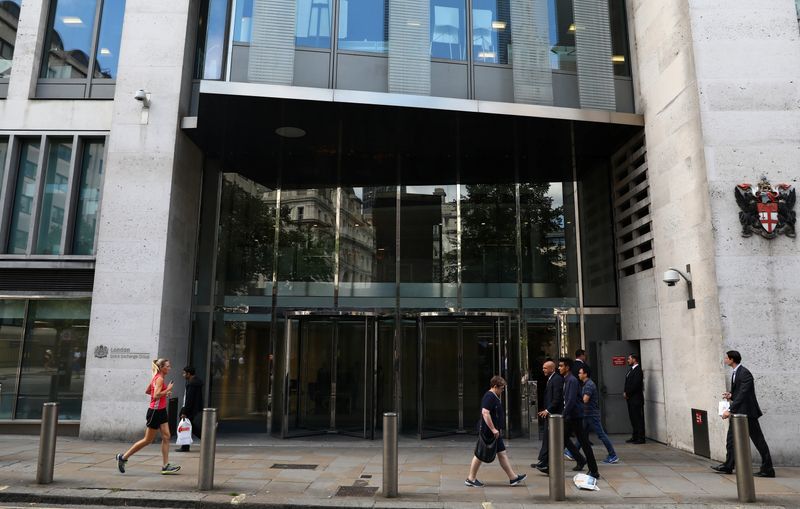By Huw Jones
LONDON (Reuters) - Britain will modernise its listing rules to attract more high-growth company and so-called blank cheque flotations, Finance Minister Rishi Sunak said after a government-backed review said London was on the back foot after Brexit.
The London Stock Exchange is facing tougher competition from NYSE and Nasdaq in New York, and from Euronext in Amsterdam since Britain fully left the European Union on Dec. 31.
In a bid to keep London globally competitive, Sunak commissioned a review of listings rules in November. It was led by former European Commissioner Jonathan Hill and published its recommendations on Wednesday.
"I'm keen we move quickly to consult on its recommendations, cementing the UK's reputation at the front of global financial services," Sunak said in a statement.
The Financial Conduct Authority (FCA) said it will act quickly, where appropriate. It will publish a consultation paper by the summer and seek to make "relevant" rules by late 2021.
The government faces pressure to act and announced a fast-track work visa scheme last week for fintechs after swathes of euro stock and swaps trading left London for Amsterdam and New York.
Nicholas Holmes, head of equity capital markets Ashurst law firm, said there was little in the review that could not have been done before Brexit.
Hill said "the composition of the FTSE index makes clear another challenge: the most significant companies listed in London are either financial or more representative of the 'old economy' than the companies of the future.
He added that there was a sense that the financial sector is on the "back foot" due to Brexit and competition from Amsterdam.
ShareSoc, which campaigns for individual investors, said the high standards of the UK listings market should be preserved and even enhanced.
Hill said his recommendations were not "radical new departures" to seize competitive advantage, but about closing a gap which has already opened up with existing practices in the United States, Asia and Europe.
British business veteran Martin Sorrell said the review signalled that the government's competitive "'Singapore on Thames' vision for a post-Brexit Britain is on the way to becoming a reality".
Sorrell, who founded and built global advertising agency WPP (LON:WPP), said this approach would serve to keep "our brightest minds and best ideas" in Britain.
'STATE OF THE CITY'
Two changes seek to move London in line with New York and other financial centres by allowing founders to list their company while still retaining significant control.
Hill recommends allowing dual class share structures to give directors and founders enhanced voting rights on certain decisions for five years, a move retail investor groups say is contrary to the "one share, one vote" principle.
The minimum "free float" or amount of a company's shares or in public hands would be cut from 25% to 15%.
"If you allow a group of owners to have enhanced ownership rights, it could lead to companies misbehaving in terms of corporate governance," ShareSoc director Cliff Weight said.
Hill also recommends liberalising listing rules for special purpose acquisition companies or SPACs. Flotations of these "blank cheque" companies in New York have surged over the past year, with Amsterdam also attracting some recently.
The prospectus, used by companies to set out their initial or secondary offer of shares, should also be fundamentally reviewed to make a listing faster and simpler, Hill said.
Hill said regulators in Australia, Singapore, Hong Kong, Japan and the EU have an objective to maintain financial sector competitiveness and this would help Britain's FCA as well.
There should also be an annual "State of the City" report form the finance minister to parliament on the financial sector's competitive position.

"Continuing to evolve the UK listings regime is key to providing flexibility for companies who want to list in London while maintaining high standards of corporate governance," said David Schwimmer, chief executive of the LSE Group.